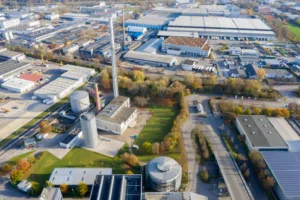Natural gas greenwashing:

Have you ever wondered if natural gas is truly a “clean” energy source? The natural gas industry often portrays itself as a bridge to a greener future, a responsible alternative to dirty fossil fuels like coal. But the reality is far more complex. In recent years, “greenwashing” has been increasingly used to describe the natural gas industry’s misleading marketing tactics.
What is “natural gas greenwashing”?
Natural gas greenwashing refers to deceptive marketing practices by the natural gas industry that make a product or service appear more environmentally friendly than it is. Companies may use misleading language, cherry-picked data, or vague sustainability claims to paint a rosy picture.
How does the natural gas industry greenwash?

The natural gas industry employs several tactics to mislead consumers about natural gas’s environmental impact:
1. Focus on “clean-burning” compared to coal: Natural gas emits less carbon dioxide (CO2) than coal when burned. However, this is a narrow comparison that ignores the bigger picture.
2. Downplaying methane emissions: Natural gas is primarily methane, a potent greenhouse gas with over 80 times the warming power of CO2 over 20 years. Leaks, from extraction to transportation, significantly contribute to methane emissions throughout the natural gas supply chain.
3. Promoting “renewable natural gas” (RNG): RNG is methane captured from landfills and waste facilities. While it can be a cleaner option than traditional natural gas, the overall environmental benefit is debatable. Capturing and processing RNG requires energy in itself, and leaks can still occur. Additionally, focusing on RNG diverts attention from the urgent need to transition away from fossil fuels altogether.
4. Investing in false advertising: The natural gas industry spends millions on campaigns portraying natural gas as a responsible choice for a clean energy future. These campaigns often use vague and emotionally charged language to distract from the facts.
Read More: Discover the Difference Between Biofuels and Biodiesel
Exploring the True Cost of Greenwashing
Greenwashing by the natural gas industry has significant consequences.
1. Slow progress towards clean energy: By promoting natural gas as a viable long-term solution, the industry diverts resources and investment away from truly clean and sustainable energy sources like solar and wind.
2. Misleads consumers: The deceptive marketing practices employed by companies, also known as “greenwashing,” contribute unintentionally to climate change.
3. Undermines public trust: When greenwashing is exposed, it erodes public trust in the natural gas industry and the energy sector as a whole.
Empowering Yourself: How to Avoid Greenwashing

With so much conflicting information available, how can you make informed choices about energy consumption? Here are some tips.
1. Do your research: Look for information from credible sources, like independent research organisations and government agencies.
2. Be wary of emotional language: Pay attention to facts and data, not marketing slogans or emotional appeals.
3. Evaluate the product’s lifecycle impacts: “Clean” and “renewable” terms should not be taken as an indication of quality.
4. Support businesses that are committed to sustainability: Look for businesses that invest in renewable energy sources and prioritise environmental responsibility.
Read More: How to Earn a Living with Biofuel Development
How Natural Gas Affects the Environment
The greenwashing narrative crumbles when we look at the data. The International Energy Agency (IEA) estimates that methane released from the global gas industry will amount to around 120 million metric tonnes in 2023. This translates into significant environmental damage, undermining any claims that natural gas is a clean alternative.
Furthermore, the infrastructure required for natural gas, from fracking wells to pipelines, disrupts ecosystems and poses health risks to nearby communities. These environmental and social costs are often overlooked in the industry’s greenwashing efforts.
Exploring the Clear Advantages of Renewable Energy over Natural Gas

1. MINIMAL to zero greenhouse gas emissions: Solar and wind farms harness the sun and wind, respectively, producing clean energy without adding to climate change.
2. Rapidly declining costs: Technological advancements have driven down the cost of solar panels and wind turbines, making renewable energy increasingly affordable.
3. Scalability and flexibility: Renewable energy systems can be scaled to fit individual homes or large-scale power grids. Additionally, advancements in battery storage technology are addressing the intermittent concerns associated with some renewable sources.
When we embrace renewable energy sources, we invest in a cleaner and more sustainable future. This not only benefits the environment but also creates jobs in the burgeoning clean energy sector.
Read More: Why Biofuel Blends Are Key to Reducing Climate Change
Empowering Consumers: Making Informed Choices About Your Energy
Understanding greenwashing tactics equips you to make informed decisions about your energy consumption. Here’s how you can take action:
1. Research your energy provider: Inquire about their renewable energy portfolio and explore options for switching to a provider with a higher percentage of renewables in their energy mix.
2. Invest in energy efficiency: Simple steps, such as switching to LED light bulbs and using energy-efficient appliances, can significantly reduce your energy consumption.
3. Support renewable energy initiatives: Advocate for policies that incentivize renewable energy development and hold your elected officials accountable for promoting sustainable energy solutions.
Read More: Exploring Quirky Sustainable Energy Solutions
Conclusion:
Natural gas may be presented as a green solution, but the greenwashing tactics employed by the industry obscure the reality. By understanding these tactics and recognising the environmental benefits of renewable energy, we can make informed choices that pave the way for a cleaner, more sustainable future. Let’s embrace the power of the sun and wind, leaving greenwashed gas behind.
The good news is that there are truly clean and sustainable alternatives to natural gas. Energy sources such as solar, wind, geothermal, and hydropower can contribute to a clean energy future. These renewable options are rapidly declining in cost, becoming increasingly efficient, and creating new jobs in the clean energy sector.
By understanding greenwashing tactics and making informed choices, we can collectively move towards a cleaner, more sustainable energy future for generations to come.










